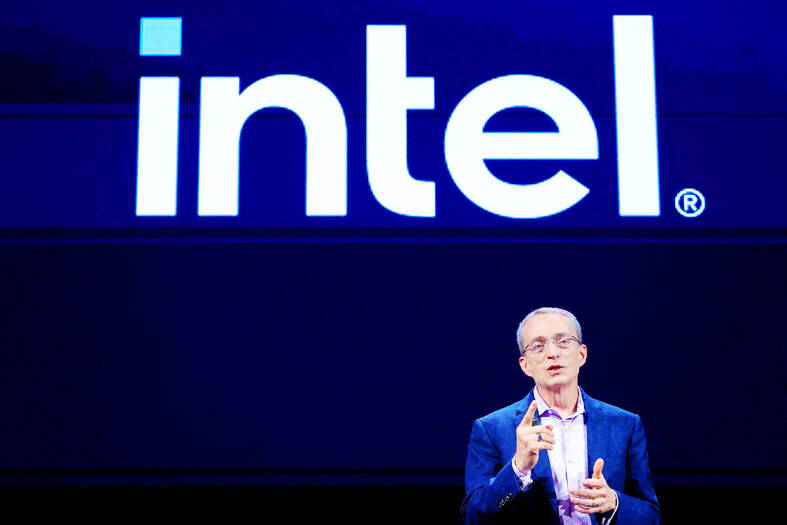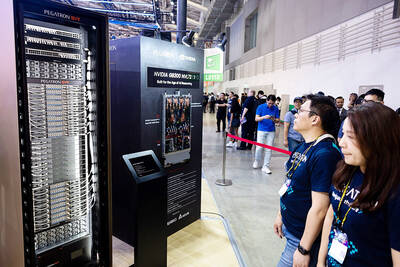Intel Corp is working with investment bankers to help navigate the most difficult period in its 56-year history, people familiar with the matter said.
The company is discussing various scenarios, including a split of its product design and manufacturing businesses, and which factory projects might potentially be scrapped, the people said, who asked not to be identified.
Morgan Stanley and Goldman Sachs Group Inc, Intel’s longtime bankers, have been providing advice on the possibilities, which could also include potential mergers and acquisitions, the people said. The discussions have only grown more urgent since Intel delivered a grim earnings report, which sent the shares plunging to their lowest level since 2013.

Photo: Ann Wang, Reuters
The various options are expected to be presented during a board meeting in September, but no major move is imminent and discussions are still in early stages, the people said.
A potential separation or sale of Intel’s foundry division, which is aimed at manufacturing chips for outside customers, would be an about-face for Intel CEO Pat Gelsinger. He has viewed the business as key to restoring Intel’s standing among chipmakers and had hoped it would eventually compete with the likes of Taiwan Semiconductor Manufacturing Co (台積電).
However, it is more likely that Intel takes a less dramatic step before it reaches that point, such as holding off on some of its expansion plans, the people said. The company has already done project financing deals with Brookfield Infrastructure Partners and Apollo Global Management.
Gelsinger is running out of time to pull off a much-needed turnaround. He has been attempting to expand the chipmaker’s factory network at the same time that sales are shrinking — a money-losing proposition. The company reported a net loss of US$1.61 billion last quarter, and analysts are predicting more red ink for the next year.
Gelsinger took the helm in 2021 and promised to restore the company’s technological edge. However, his comeback plan proved overly ambitious, and the company has had to scale back. Intel earlier this month said it plans to cut about 15,000 jobs and slash capital spending. The company even suspended its long-prized dividend.
“It’s been a difficult few weeks,” Gelsinger told investors at the Deutsche Bank Technology Conference on Thursday.
The company tried to lay out a “clear view” of its next steps during its earnings report, but the “market didn’t respond positively,” he said.
Intel director Tan Lip-bu (陳立武), who was brought in two years ago to help with the comeback effort, also abruptly stepped down from the board last week, citing scheduling commitments. His departure removed one of the few directors with industry knowledge and experience.
Intel shares have declined 60 percent this year, compared with a 20 percent gain for the Philadelphia Stock Exchange Semiconductor Index, a chip industry benchmark.
Gelsinger’s comeback plan hinged on recasting Intel into two groups: one that designs chips and another that manufactures them. The production arm would then be free to seek business from other companies. However, the biggest client of Intel’s factory network is still Intel. Until the foundry business has more outside customers, it is going to be challenged financially.
It reported operating losses of US$2.8 billion in its most recent quarter and is on course to have a worse year than projected.

AI TALENT: No financial details were released about the deal, in which top Groq executives, including its CEO, would join Nvidia to help advance the technology Nvidia Corp has agreed to a licensing deal with artificial intelligence (AI) start-up Groq, furthering its investments in companies connected to the AI boom and gaining the right to add a new type of technology to its products. The world’s largest publicly traded company has paid for the right to use Groq’s technology and is to integrate its chip design into future products. Some of the start-up’s executives are leaving to join Nvidia to help with that effort, the companies said. Groq would continue as an independent company with a new chief executive, it said on Wednesday in a post on its Web

RESPONSE: The Japanese Ministry of Finance might have to intervene in the currency markets should the yen keep weakening toward the 160 level against the US dollar Japan’s chief currency official yesterday sent a warning on recent foreign exchange moves, after the yen weakened against the US dollar following Friday last week’s Bank of Japan (BOJ) decision. “We’re seeing one-directional, sudden moves especially after last week’s monetary policy meeting, so I’m deeply concerned,” Japanese Vice Finance Minister for International Affairs Atsushi Mimura told reporters. “We’d like to take appropriate responses against excessive moves.” The central bank on Friday raised its benchmark interest rate to the highest in 30 years, but Bank of Japan Governor Kazuo Ueda chose to keep his options open rather than bolster the yen,

Even as the US is embarked on a bitter rivalry with China over the deployment of artificial intelligence (AI), Chinese technology is quietly making inroads into the US market. Despite considerable geopolitical tensions, Chinese open-source AI models are winning over a growing number of programmers and companies in the US. These are different from the closed generative AI models that have become household names — ChatGPT-maker OpenAI or Google’s Gemini — whose inner workings are fiercely protected. In contrast, “open” models offered by many Chinese rivals, from Alibaba (阿里巴巴) to DeepSeek (深度求索), allow programmers to customize parts of the software to suit their

Global server shipments are expected to surge to 15 million units next year, from 4 million units this year, with artificial intelligence (AI) servers accounting for about 30 percent, driven by massive capital spending by major cloud service providers, the Market Intelligence and Consulting Institute (MIC) said on Thursday last week. Major cloud service providers — including Google’s parent company Alphabet Inc, Microsoft Corp, Amazon.com Inc and Meta Platforms Inc — are projected to budget US$450 million for capital expenditure next year, up from US$400 million this year, MIC ICT [information and communications technology] Industry Research Center director Edward Lin